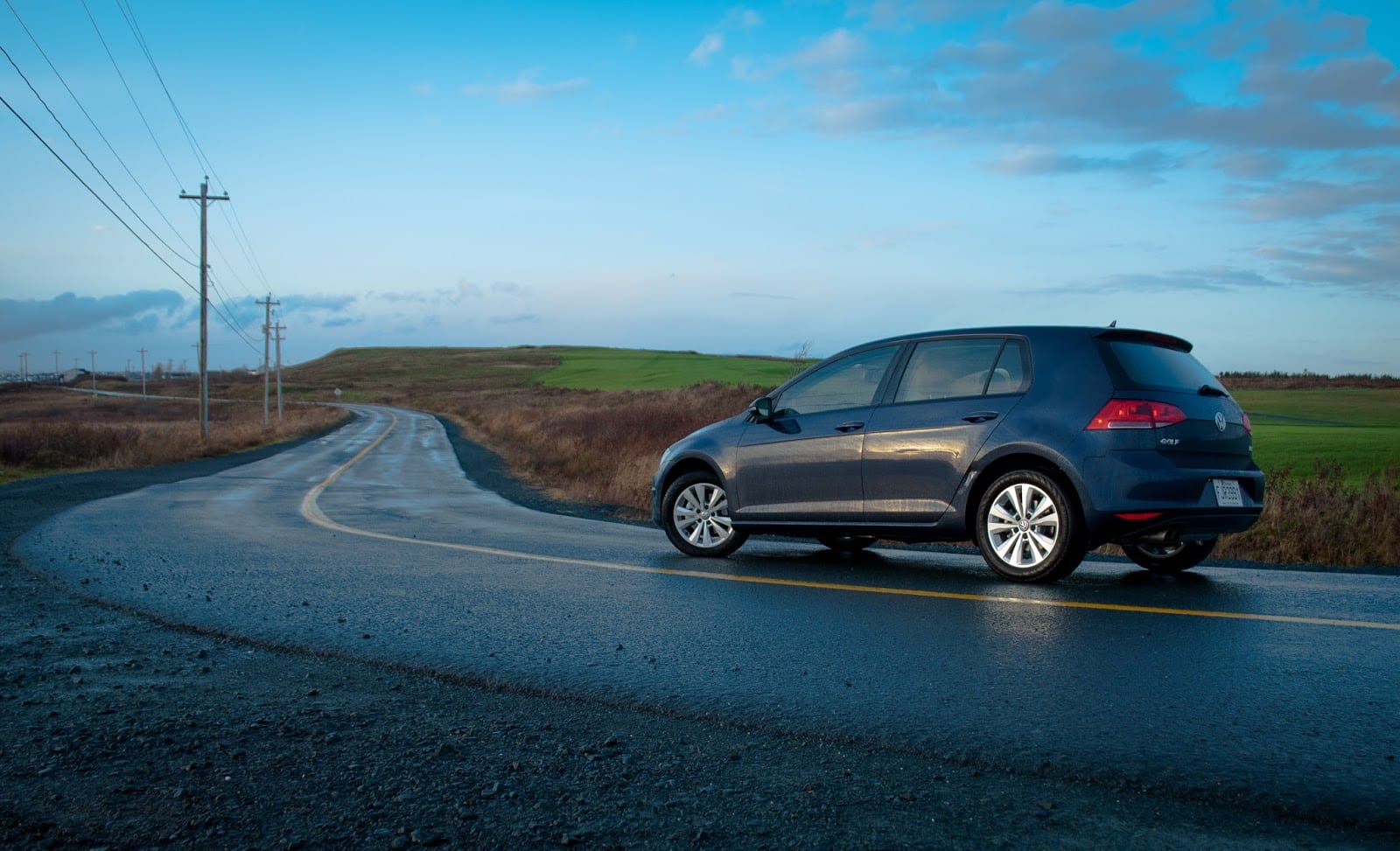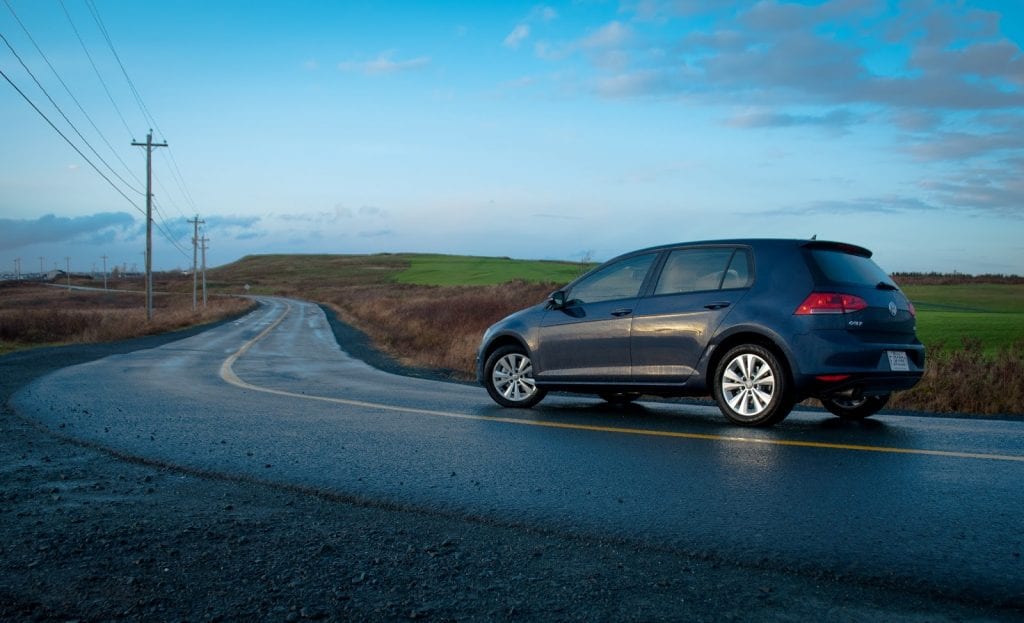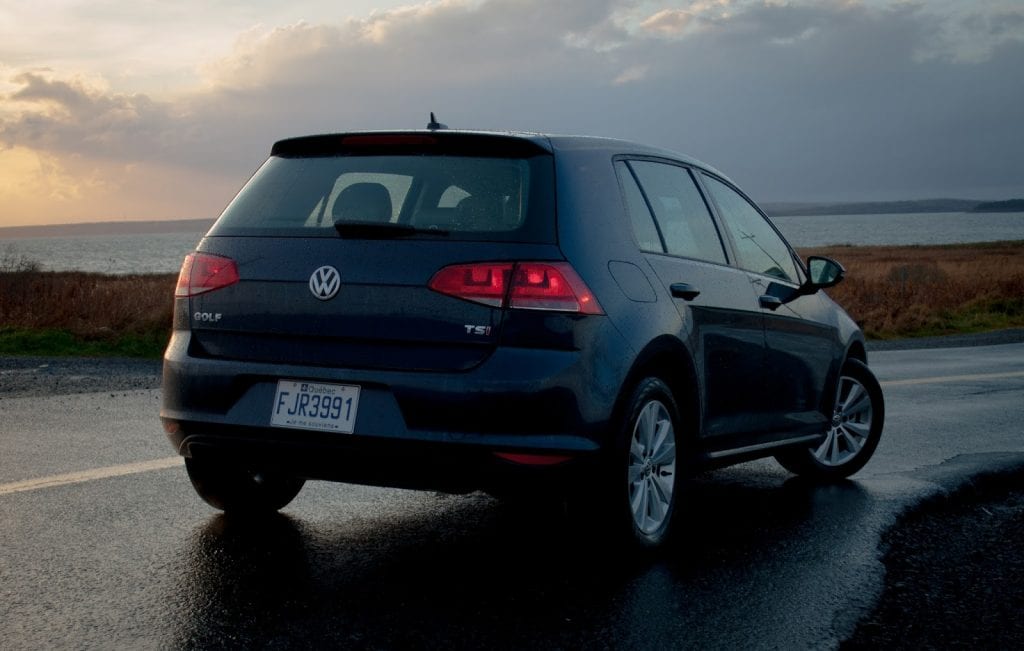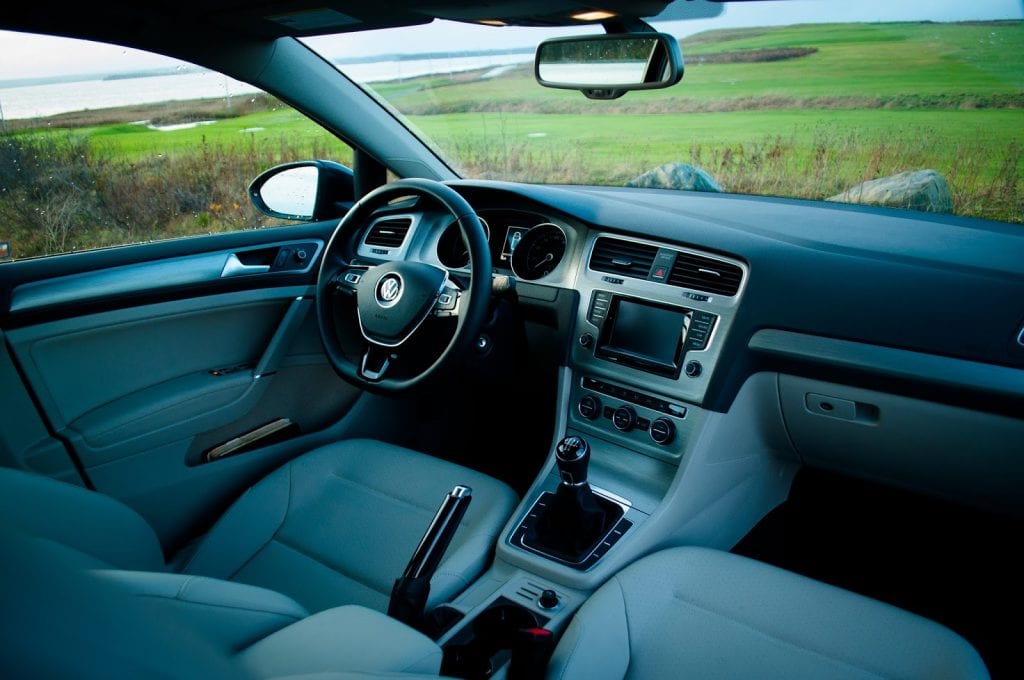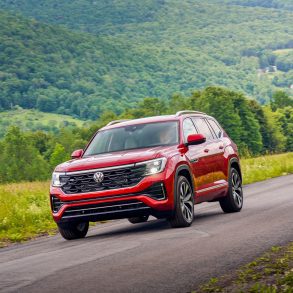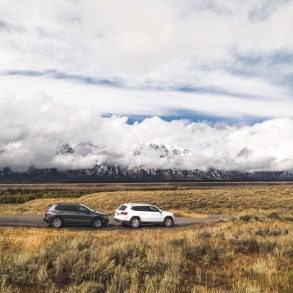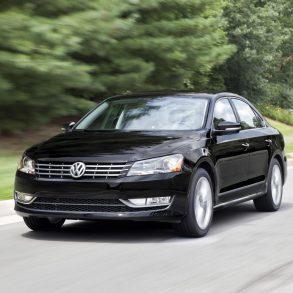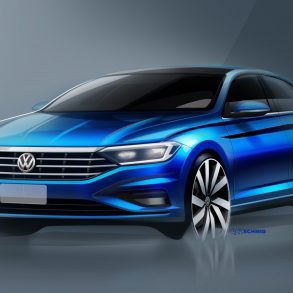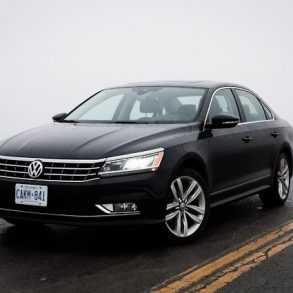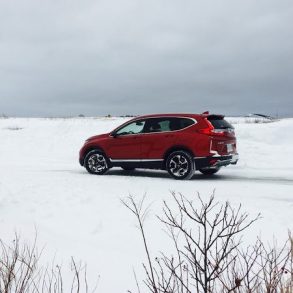13 years ago, Golf-based Volkswagen GTIs produced 180 horsepower from a 1.8L turbocharged four-cylinder powerplant. Over the last week, I’ve been driving a brand new Golf that’s also fitted with a 1.8L turbocharged four-cylinder. It generates 170 horsepower.
In 2002, you could pair Volkswagen’s 1.8T with a 6-speed manual transmission. Our test car used a 5-speed manual.
Is this progress? Strangely, yes.
| THE GOOD • Overall on-road behaviour • Powerful base engine • Luxurious ambience • Interior quality • Timeless styling |
THE BAD
• TDI still more appealing than TSI
• Not exactly inexpensive
• Fuel economy disappointed • 5-speed? • Rear seat space could use a boost |
The new car makes way more torque: 185 lb-ft at 1600 rpm compared with 173 lb-ft at 1950 rpm. According to EPA tests, it also travels 25% farther on a litre of fuel. Regular fuel, too. The old car drank premium.
Regardless of what the spec sheet says, the new 1.8T is still a very quick car when mated to the 5-speed manual. And though the transmission would surely benefit from a tall sixth gear and feels as though it could use more tightly spaced ratios, shift quality is excellent and the clutch is friendly, with no learning curve required.
Over the course of a decade and multiple generations of Golf, the greater gains have (clearly) not come in terms of outright power but in overall refinement and the driving experience as a whole. These upgrades are unlikely to change the fact that the wild fuel economy figures achieved by diesel-powered Golfs will still draw greater Canadian attention. Like the well-behaved child who always carries his dishes back to the sink with two hands and efficiently and correctly finishes his homework, but who still sees all his parents’ attention paid to his delinquent little brother, der neue base Golf does its level best but still isn’t as desirable as its siblings.
OUR CAR
This four-door, manual-shift Golf, loaned to us for a week-long visit by Volkswagen Canada was priced at $25,985 (freight and PDI included) with one $1695 option package. As a mid-grade Comfortline example, this Golf featured a sunroof, leatherette upholstery, and dual-zone climate control.
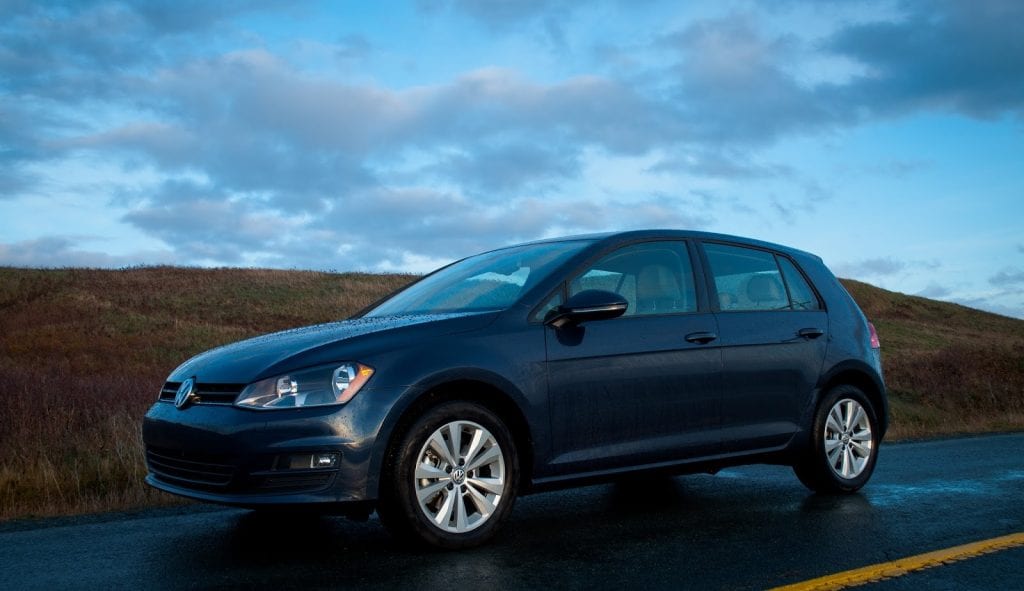 |
| All Photo Credits: Timothy Cain ©www.GoodCarBadCar.net Click Any Of These Images For A Larger Slideshow View |
Absent the optional Fender system, audio quality was still more than acceptable. Volkswagen’s 2.0L turbodiesel $2500 in to the cost of any Golf in Canada. A 6-speed automatic transmission is another $1400.
|
2015 VOLKSWAGEN GOLF
1.8 TSI COMFORTLINE Base Price * (CAD): $21,390 As-Tested Price * (CAD): $25,985 Engine: 1.8L 16-valve turbocharged four-cylinder
Transmission: 5-speed automatic Horsepower: 170 @ 4800 rpm
Torque: 185 lb-ft @ 1600 rpm
Curb Weight: 2906 pounds Drive Type: front-wheel-drive Length: 168.0 inches Width: 70.8 inches Height: 56.8 inches Wheelbase: 103.8 inches Tires: Continental ContiProContact Tire Size: 205/55R16 Passenger Volume: 2648 litres Cargo Volume: 671 litres Max. Cargo Volume: 1521 litres EPA City: 25 mpg EPA Highway: 37 mpg
NRCAN OEE City: 9.3 L/100km NRCAN OEE Hwy: 6.4 L/100km Observed: 28 mpg Observed: 8.4 L/100km * includes $1395 destination charge Golf 5-Door Comfortline base price: $24,290 Golf 3-door base price: $20,390 MPG fuel economy ratings from the Environmental Protection Agency. L/100km ratings from the Canadian Office of Energy Efficiency’s new 5-cycle testing for MY2015 vehicles. |
INSIDE
With fuzzy carpeting spread across the front doors’ storage compartments and a dash covered in material so squeezable I expected fruit juice to come pouring out, there’s no doubt that the Golf’s perceived quality quotient tops the class.
The Golf’s infotainment unit lags, both in actual use and behind segment leaders like Mazda Connect. It’s not a terrible system to use – I liked how it allowed me to scroll through satellite radio stations without actually selecting one – but the graphics and operational speed are behind the times.
The 5.8-inch screen also seems too small for a proper backup camera, or is it just that the the camera isn’t a particularly good one, washed out as it was in daylight and too dim later in the day?
Comfort is a key Golf edge, with first-rate seats and a huge range of adjustment in those seats and the steering wheel. Wind and road noise is something other small car owners encounter, but the Golf offers a proper luxury car ambience, only decontented.
Rear seat space doesn’t impress, however, as the placement of the especially narrow Diono Radian RXT in the middle position required an adult alongside to slam the door on their hip.
Sure, it’s a small car, but many small cars these days do better. Hatchback versions of the Hyundai Elantra, Mazda 3, and Subaru Impreza all have more overall space for humans.
STOWAGE
The Golf does have a bit more space behind the rear seat than the 3 and Impreza, however, and the cargo area is shaped like a box with little intrusion. Seats down capacity beats the Elantra, as well.
Of course, all are surprisingly practical cars, yet they also help to clarify the appeal of small crossovers, as our Baby Jogger Summit X3 needed its wheels removed if it was to fit under the cargo cover in the Golf. Where’s the Golf R wagon when you need it?
FITTING ROOM
Like virtually all continuing nameplates, Golfs have certainly grown over the span of generations. This Mk7 car is 167.5 inches long on a wheelbase of 103.8 inches; 2.6 inches longer than the Mk4 car we mentioned earlier with a wheelbase that’s been stretched nearly five inches. Relative to modern machines, the current Golf is just under two feet shorter than a new Toyota Camry; 7.5 inches longer than the 2015 Honda Fit. It’s 14.7 inches shorter than the latest Jetta with slightly less wheelbase and slightly greater width.
GOING/STOPPING/TURNING
Those tidy dimensions are central to the Golf’s on-road appeal. It’s as tossable as a properly set-up subcompact but as unflustered as a much larger car. Mid-corner pavement protrusions don’t bother the Golf even when you’re driving as enthusiastically as you might in its GTI sibling. The Golf’s brake pedal could be firmed up, but the weight of other controls is in keeping with the car’s mission.
• Historical Monthly & Yearly Volkswagen Golf Sales Figures
• 2013 Volkswagen Golf TDI Wolfsburg Driven Review
• 2014 Mazda 3 Sport GS Driven Review
• 2014 Volkswagen Jetta GLI Edition 30 Driven Review
It’s not a hot hatch, but there’s no mistaking this ordinary Golf (on unaggressive 205/55R16 Continental ContiProContacts) for anything other than the foundation of a great hot hatch. Quicker turn in, sharper throttle response, and a suspension that needs only to be modestly stiffened would produce a wonderful all-rounder. It is not crying out for more torque.
RIVALS
A Mazda 3 offers much of the Golf’s driving appeal but lacks its hushed cabin and always-serene ride quality. Subaru’s Impreza does not come within range of matching the Golf’s upmarket interior but offers Vermont’s favourite all-wheel-drive system. It’s obviously difficult for the Golf to match the value and content of the Hyundai Elantra GT and Kia Forte5, but the driving experiences between those cars and the remarkable Golf are worlds apart.
SELLING
Over the course of the last ten months – but not in the last two – the Golf lineup has been outsold in the U.S. by its own offspring, the GTI. With the Mk7 now widely available, the non-GTI/R/E Golf lineup doubled its U.S. October volume. Yet at 2351 units, it was by no means a popular car in America. HybridCars.com says 41% of the non-GTI Golfs sold this year have been diesels. The Golf family is Germany’s best-selling vehicle; the UK’s fourth-best-selling vehicle. In October 2014, it was Canada’s tenth-best-selling car.
VERDICT
Aside from a frumpy radio and a sunroof visor which crudely slides back and forth, the Golf is an impressive piece, not just lacking in glaring faults but full of admirable elements. One might wonder why Americans are so indifferent, until one realizes that an entry-level midsize price point makes for a tough sell. The Golf 1.8 TSI is a car I want, it’s just not a car I want to pay for, not with these interior dimensions on this continent. Not when this car consumed 8.4 litres of fuel per 100 kilometres in a mix of city and highway driving while the last Golf TDI we tested sipped just 5.8 L/100km.
Oh, have a little compassion for the well-behaved gas-fired Golf. Even when reviewed positively, the whole story deteriorates into praise of its oil-burning sibling. We might as well pile on by mentioning the superior styling of the Mk1’s round headlights.

